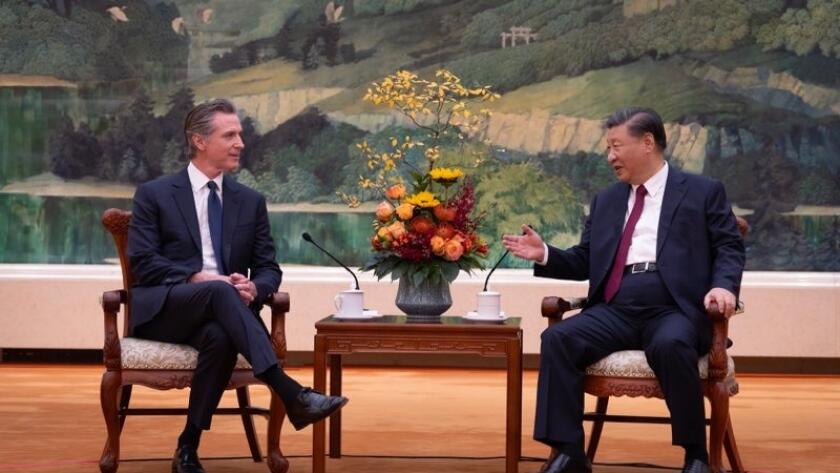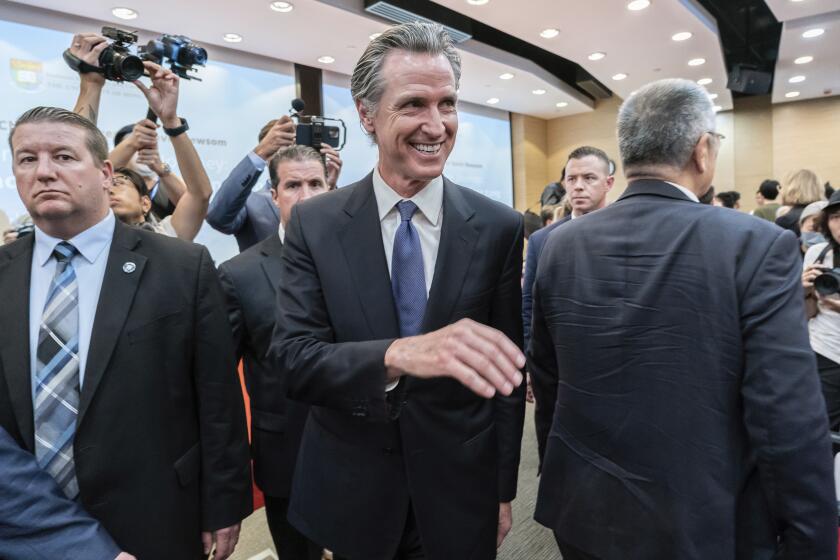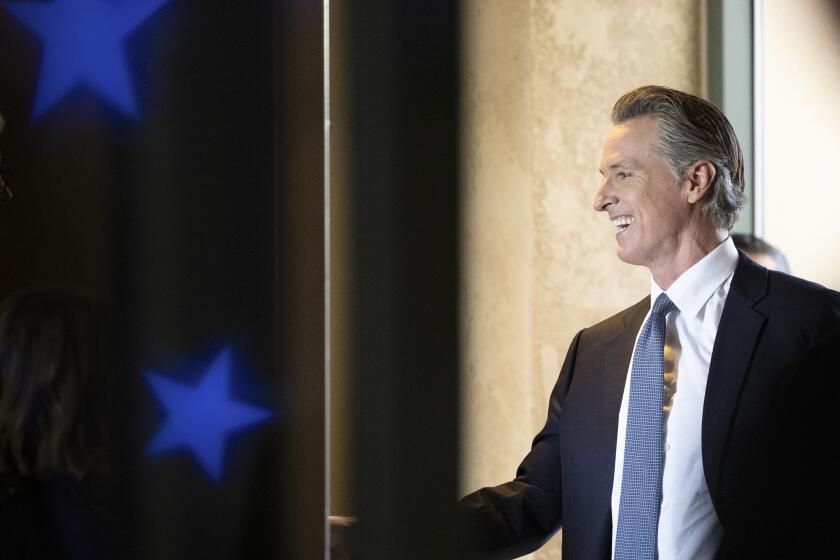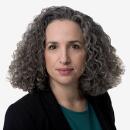Newsom meets with President Xi Jinping in Beijing amid troubled U.S.-China ties
- Share via
The meeting comes amid tense U.S.-China relations and as the California governor navigates a challenging diplomatic landscape on his trip abroad.
- Share via
BEIJING — California Gov. Gavin Newsom met with Chinese President Xi Jinping on Wednesday as the U.S. grappled with rising tensions with the world’s second-largest economy and the Democratic governor worked to navigate a challenging diplomatic landscape on a trip meant to promote climate cooperation.
The meeting at the Great Hall of the People in central Beijing came as China’s top diplomat announced plans to visit Washington on Thursday, and weeks before the Asia-Pacific Economic Cooperation conference in San Francisco, where President Biden may meet with Xi — signals that both sides could make efforts to improve what’s become a frosty relationship.
It was Newsom’s second meeting with a foreign government leader in less than a week, after he met with Israeli Prime Minister Benjamin Netanyahu in Tel Aviv on Friday — an extraordinary foray into international affairs for a governor who has no authority on global matters. Though he has repeatedly said he is not planning a run for president, Newsom’s sudden pivot to international diplomacy allows him to build experience that could help in a future run for higher office.
In Beijing, where Chinese handlers tightly controlled media access, American reporters were not allowed into the meeting between Newsom and Xi.
Talking with reporters afterward, Newsom said he spoke with Xi about climate change, trade, tourism and the fentanyl crisis that has gripped the United States, areas in which he hopes the two nations can cooperate.
On fentanyl, Newsom said the two men discussed so-called precursor chemicals that make their way through the black market from China to Mexico and then into the U.S. as deadly pills.
Gov. Gavin Newsom’s voyage to Israel and China marks a sudden leap into foreign affairs for the California governor who insists he is not angling to run for president.
“We talked about the importance of this issue and how it’s played an outsized role as the leading cause of death for 18- to 49-year-olds in the United States,” Newsom said. “It’s taking the life of one-plus person every single day in San Francisco.”
He described fentanyl as an issue that “should scare every parent out there” because of how many young people are dying from taking pills that they don’t know contain the drug.
“This is a big, big issue,” Newsom said.
Before his talks with Xi, Newsom met with three other Chinese officials. American media were allowed to cover just a few minutes of each of those meetings as Newsom and the Chinese dignitaries made introductory remarks.
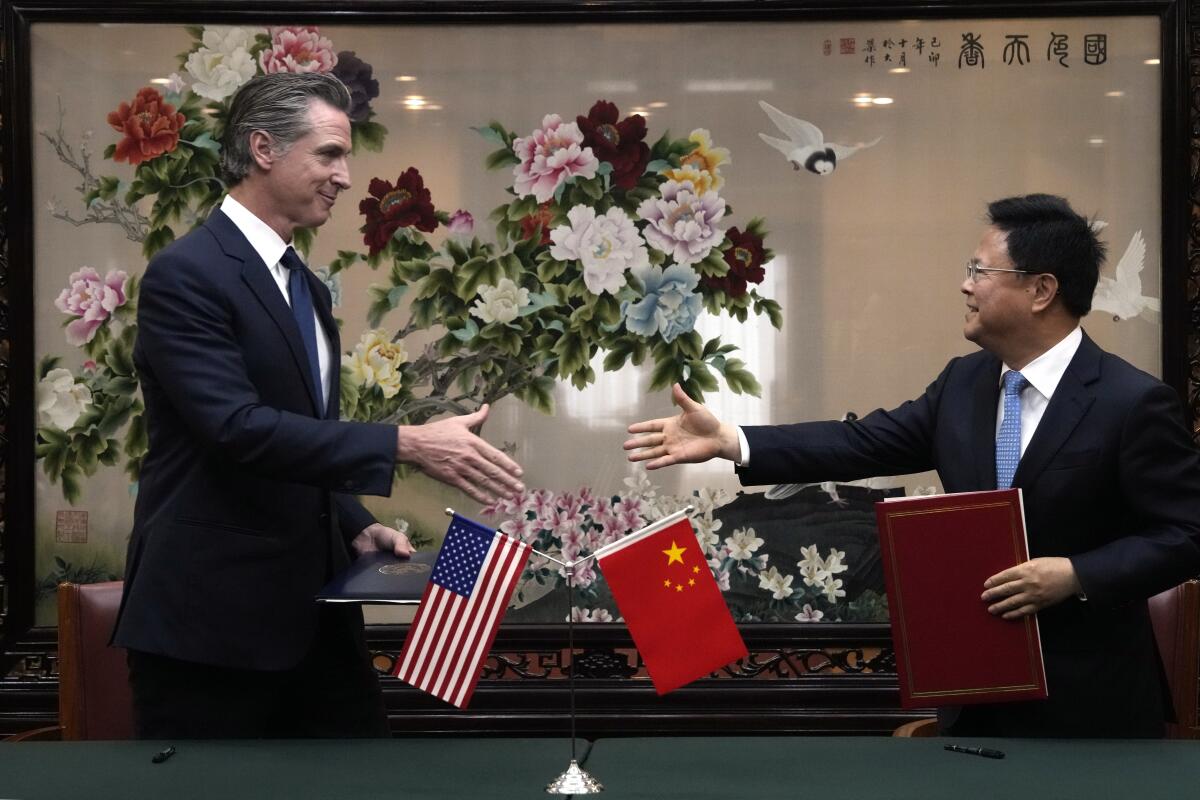
Newsom said he talked with them about issues including human rights abuses in Hong Kong, his desire to see a two-state solution in Israel and his hope that China will release David Lin, a California resident who has been detained in China since 2006.
“We hope David Lin comes back. We hope he’s released,” Newsom said. “He’s 67 years old, he’s a man of faith, and he’s being held. ... On the basis of what I know, and with humility, but with what I know, he should be released.”
Newsom said he sees discussions about cooperating to fight climate change as a way to open the door to broader relationships between the U.S. and China, noting that “we all breathe the same air.”
A tense geopolitical climate has loomed over Newsom’s voyage to promote cooperation on climate-friendly technologies such as electric vehicles and wind energy. Relations between the U.S. and China were already strained before this month’s eruption of war between Israel and Hamas presented a new potential wedge between the world’s two superpowers.
Newsom is expected to meet with top officials on the topics of clean energy, air pollution and the transition to electric vehicles, among other topics.
China and Russia announced last week that they intend to work together to create an alliance that could attempt to counter U.S. support for Israel. The Pentagon reported recently that China is building up its nuclear weapons arsenal faster than previously projected and is probably studying Russia’s war in Ukraine to get a sense of how a conflict over Taiwan could play out. China immediately fired back that the report is false, and blasted the U.S. as the world’s “biggest disruptor of regional peace and stability,” citing America’s recent actions to help Israel and Ukraine.
All that comes on top of disagreements between the U.S. and China over trade, human rights and the militarization of the South China Sea. In February, the U.S. shot down a Chinese balloon that flew over sensitive military installations. In August, Biden signed an executive order to block and regulate U.S. investments in Chinese tech companies.
Newsom, who said he urged Xi to come to San Francisco for the APEC conference next month, is the first U.S. governor to visit China since 2019. His visit could help improve dynamics between the two nations, said Susan Shirk, a political scientist at UC San Diego.
In a new report, the U.S. State Department has laid out efforts by Beijing, costing billions of dollars, to reshape the global narrative on China.
“Right now the U.S. and China are in a downward spiral in their relationship. It’s really quite dangerous, and we’re not going to prevent further deterioration of relations — or even the risk of war — unless our decision-makers talk to one another,” Shirk said.
“So diplomacy is really important.”
Newsom began the day in Beijing on Wednesday by signing a clean-energy agreement with the leader of China’s National Development and Reform Commission, which oversees the country’s economic development plans. Then he met with Foreign Minister Wang Yi, who is traveling to Washington this week to meet with U.S. Secretary of State Antony J. Blinken.
It was Newsom’s meeting with Vice President Han Zheng that showed the personal dimension of political relationships built over time. Han recalled meeting Newsom almost20 years ago when he was the mayor of Shanghai and Newsom was the mayor of San Francisco. As sister cities, San Francisco and Shanghai developed long-standing economic and cultural exchanges that Han called “a good example of China-U.S. subnational cooperation.”
Start your day right
Sign up for Essential California for the L.A. Times biggest news, features and recommendations in your inbox six days a week.
You may occasionally receive promotional content from the Los Angeles Times.
China-U.S. relations are “the most important bilateral relations in the world, and subnational cooperation [plays] an indispensable part to facilitate a sound and steady growth of China-U.S. relations,” he said through an interpreter.
“National-level relations must also include the relations between states, between sectors of society and between the business communities. Only by doing this can we bring the relations back to the right channel of development.”
Newsom paid tribute to the late Sen. Dianne Feinstein (D-Calif.) in his remarks to the vice president, recalling her work to establish the sister-city relationship with Shanghai when she was San Francisco mayor in the 1980s.
“I cannot impress upon you more how indelible her memory and her mentorship is in relationship to maintaining the relationship to China,” Newsom said. “It’s the foundation that was built that reminds me of how important it is to continue to advance this spirit that unites us here today.”
Shirk said it’s risky for American politicians to engage with Chinese officials. But, she said, it’s also beneficial.
“China’s going to be there forever, even after Xi Jinping,” she said. “So it’s really good to maintain relations at the people-to-people level.”
More to Read
Sign up for Essential California
The most important California stories and recommendations in your inbox every morning.
You may occasionally receive promotional content from the Los Angeles Times.
